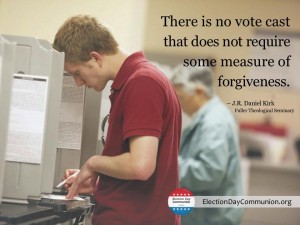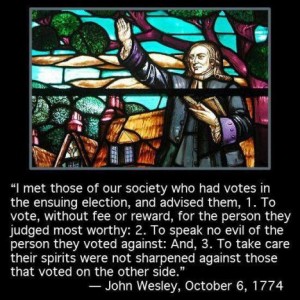It’s election day. This is a day that is filled with our best, our brightest, our greatest. It is a time of reflecting on our past, being honest about our present, and longing for a better future. It should be a time when our country comes together and celebrates the miracle of freedom.
Unfortunately, it is also the day that we as flawed citizens choose our flawed leaders. It is the day that we as people of faith feel torn between allegiances. Sometimes our personal viewpoints do not align with our spiritual aspirations, which is part of our flawed existence. Often we are not even aware of the contradiction. This is even more evident in our leaders, who have had every aspect of their hearts, minds and souls analyzed, dissected, and exposed. Their flaws are even more evident to us than our own.
So we seek compromises, attempting to weigh the rightness of one candidate’s viewpoint with the flaws within that same candidate. We choose a candidate who we see as purely right on some of the issues, but of course they are not right on all of them. Such compromises seldom sit well with us. It’s unnerving, especially to our souls which long for something absolute and concrete. This unnerving sensation is intensified by the loudness of the campaign itself.
In the end, we can often find ourselves frustrated. Our hearts cry out for understanding, our minds look for reason in the midst of chaos, our souls merely want peace. If we leave the voting booth with absolute conviction, there’s a reasonable chance that we’ve muffled those instincts. If we leave the voting both with doubts and confusion, we’re being more honest, but we’re not particularly aflame with zeal for the process.
As we reflect on our vote today, perhaps it would be helpful to hear a few voices that can rise above the din. A few that find the ability to reside within the contradiction.

Fuller Theological Seminary professor J.R. Daniel Kirk said, “There is no vote cast that does not require some measure of forgiveness.” I for one plan on spending time in confession today.
The Apostle Paul wrote in Romans, “Let every person be subject to the governing authorities. For there is no authority except from God, and those that exist have been instituted by God.” There’s a bit of that soul satisfying peace to cling to, whether your candidate wins or not.
Paul also wrote in Titus, “Remind them to be submissive to rulers and authorities, to be obedient, to be ready for every good work, to speak evil of no one, to avoid quarreling, to be gentle, and to show perfect courtesy toward all people.” Maybe we should make this a job description for all campaign managers!
Samuel Adams said, “He therefore is the truest friend to the liberty of this country who tries most to promote its virtue…” Virtue. Now there’s a political goal that is overlooked. Perhaps it is one we can embrace as we seek accommodation with realities.
 John Wesley gave three forms of advice to voters, “1. To vote, without fee or reward, for the person they judged most worthy
John Wesley gave three forms of advice to voters, “1. To vote, without fee or reward, for the person they judged most worthy
2. To speak no evil of the person they voted against, and 3. To take care their spirits were not sharpened against those that voted on the other side.”
I love this bit of humility from Abraham Lincoln, “I have been driven many times upon my knees by the overwhelming conviction that I had nowhere else to go. My own wisdom, and that of all about me, seemed insufficient for the day.” Amen to this, and it’s how I often feel when I reflect on difficult issues.
I’ll conclude with one more. The Book of Common Prayer offers this beautiful appeal:
“Lord God Almighty, you have made all the peoples of the earth for your glory, to serve you in freedom and in peace: Give to the people of our country a zeal for justice and the strength of forbearance, that we may use our liberty in accordance with your gracious will; through Jesus Christ our Lord, who lives and reigns with you and the Holy Spirit, one God, for ever and ever. Amen.”
Indeed, Amen.
